北师大(三起)五年级英语上册课件 unit6(3)
文档属性
| 名称 | 北师大(三起)五年级英语上册课件 unit6(3) | 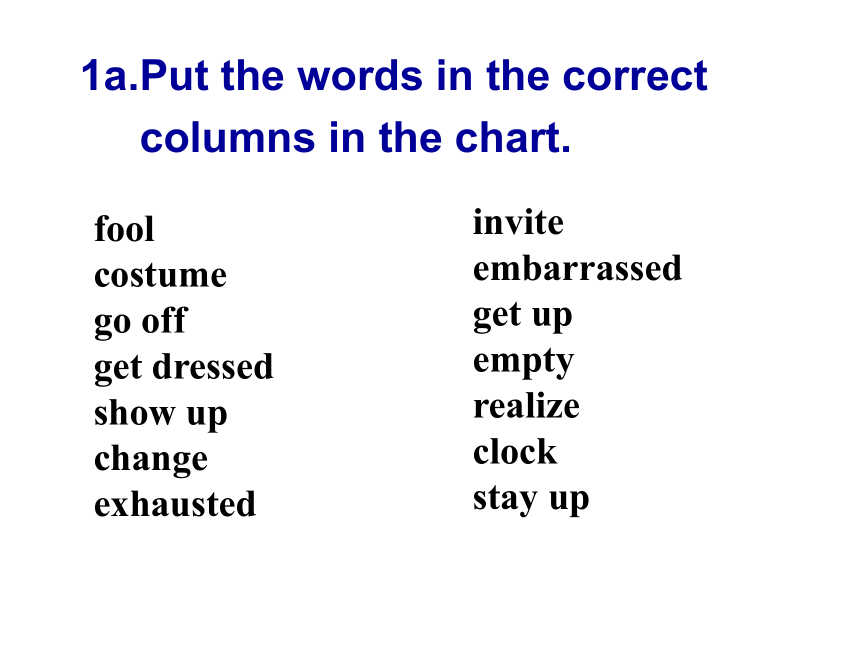 | |
| 格式 | zip | ||
| 文件大小 | 1.6MB | ||
| 资源类型 | 教案 | ||
| 版本资源 | 北师大版 | ||
| 科目 | 英语 | ||
| 更新时间 | 2013-01-30 16:57:30 | ||
图片预览

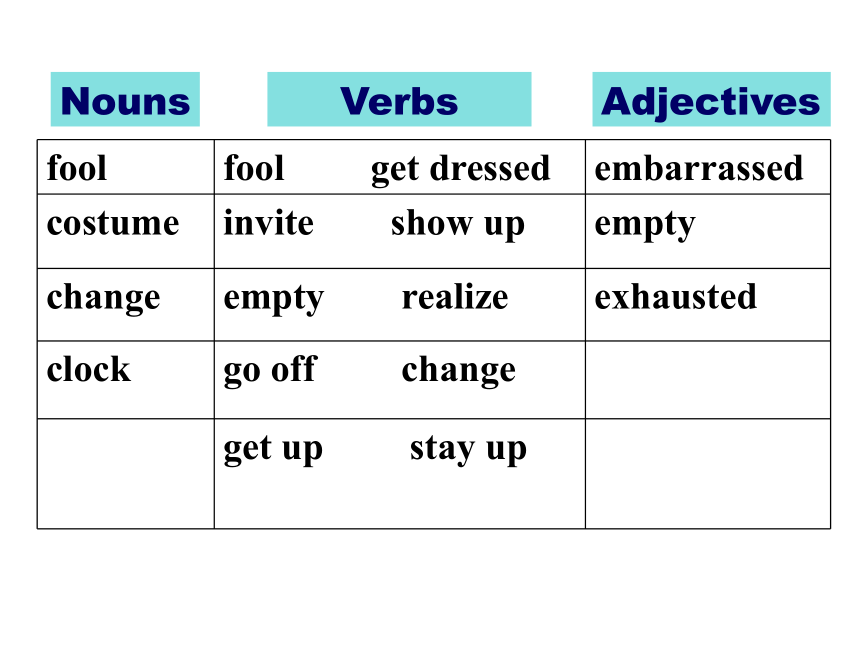
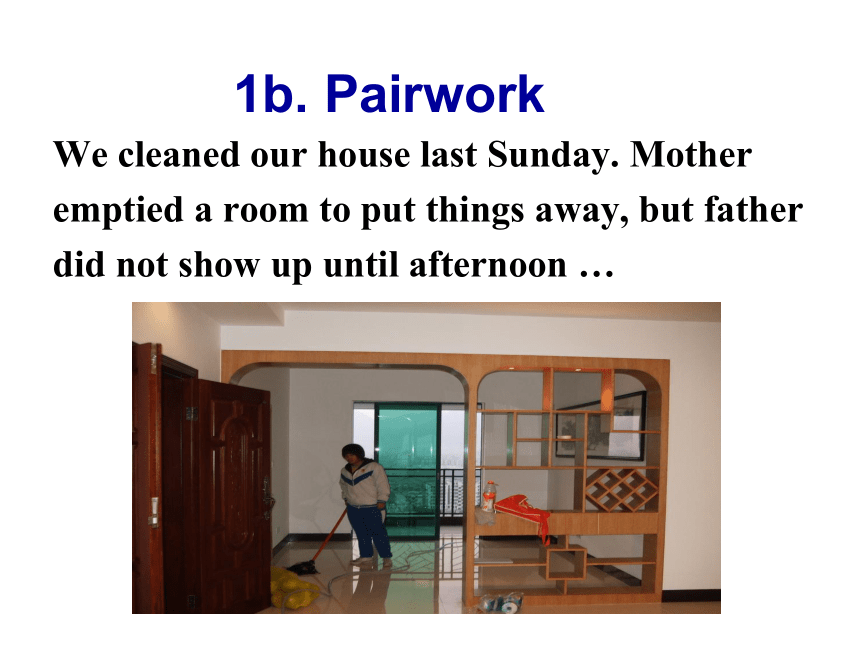
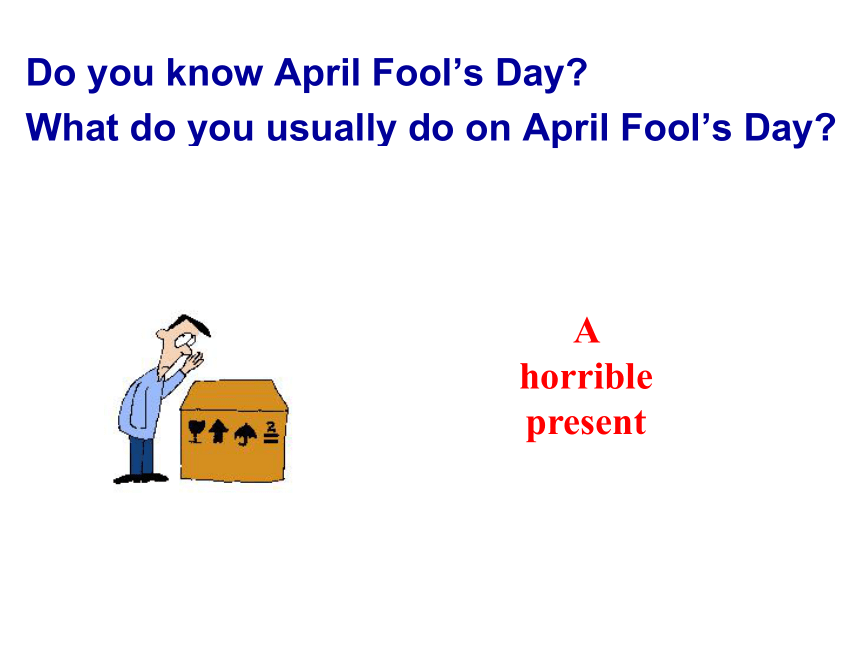
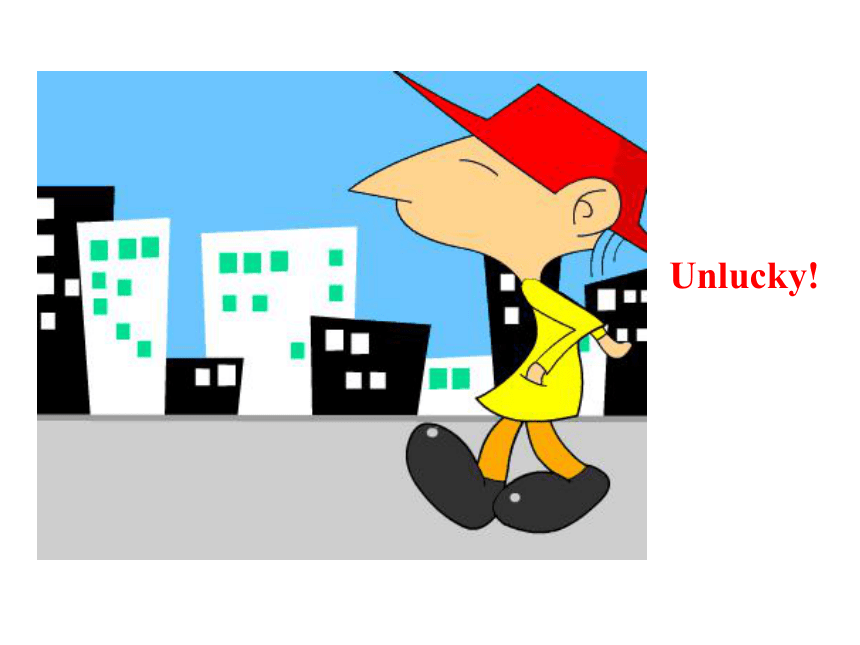
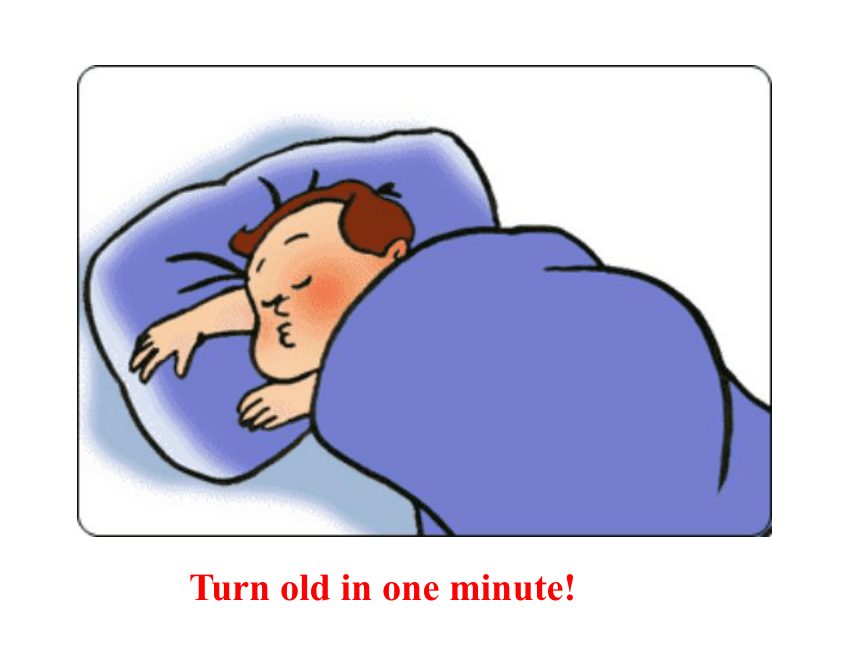
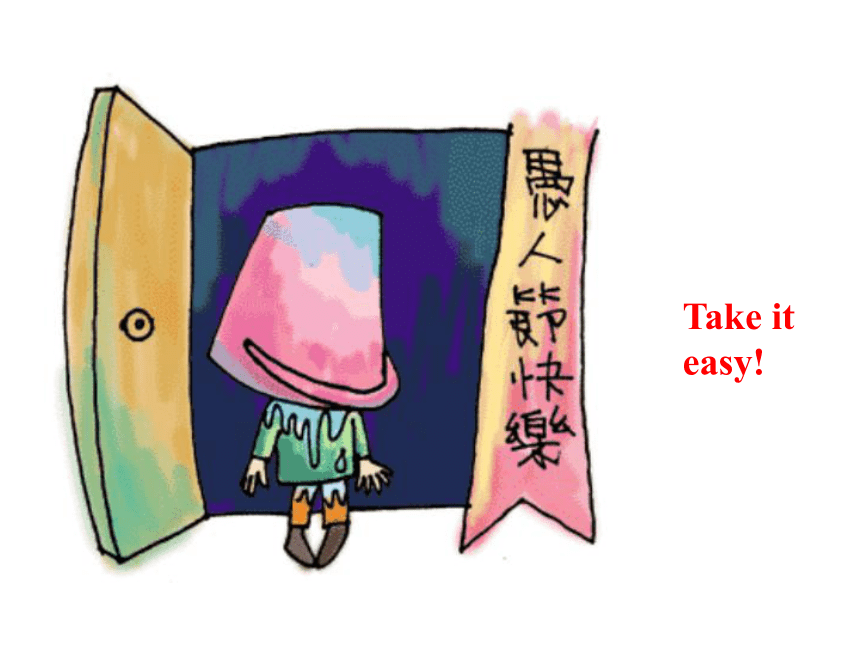


文档简介
课件21张PPT。1a.Put the words in the correct
columns in the chart. fool
costume
go off
get dressed
show up
change
exhaustedinvite
embarrassed
get up
empty
realize
clock
stay up
NounsVerbs AdjectivesWe cleaned our house last Sunday. Mother
emptied a room to put things away, but father
did not show up until afternoon … 1b. Pairwork Do you know April Fool’s Day?
What do you usually do on April Fool’s Day?A horrible presentUnlucky!Turn old in one minute!Take it easy!Take care!I am hurt!2a. Listen and write each person’s
name under his picture. No name Joe Dave 2b. Listen again. Who says each of the phrases below?DNJJDN_____ a costume party
_____ my alarm went off
_____ stayed up all night
_____ was exhausted
_____ really embarrassed
_____ the other kids showed up2c. Groupwork What happened to Dave on April Fool’s Day?Well, a friend invited him to a costume party. When he got there, he found that his friend had fooled him.1.The plane will land in ten minutes.
2. The reason he told is so convincing that the boss totally believed him.
get onto the groundworth of trusting or believing3a. Before reading, Guess what the
underlined words mean. 3. The police revealed the truth after long time’s research.
4.It is announced in the broadcast that the meeting will be put off.
to show, let people knowtell sth publicly
1. The aliens from Mars landed on the earth.
2. There were not many people who believe the story told by Welles.
3. There will be no spaghetti because farmers in Italy don’t want grow it. FFFRead the three stories and decide
whether these sentences are true or
false. 4. People were fooled by the reporter.
5. The TV star’s girlfriend will marry him.
6. People don’t like the famous star after the
joke.
TFTAfter reading, which story do you think is the most believable? Why?
Which is the least believable? Why?
Get into groups and think of as many reasons as you can to support your opinion. Then show it to the whole class. 1The first story really
happened. The radio
program was called
“The War of the
World”.
(3) set off 意为“出发, 开始;引爆;衬托”。
e.g. He will set off on a journey around the world.相关链接:与set有关的词组
(1) set about sth. 开始,着手
I must set about my packing.
(2) set sb. against sb. 使某人和某人竞争、对抗
Set yourself against her.
(3) set in 开始
The rainy season has set in.
(4) set out 出发,启程 set sth. out 展示,陈列
They set out at dawn.
(5) set up 建立, 设立
The memorial will be set up.4. She was thrilled, because she really wanted to
get married.
(1) thrill为动词“震颤, 使激动”, 多用于被动语态
be thrilled, 表示“很感动,受到震颤的”。
e.g. We were thrilled with joy.
(2) marry为动词“嫁, 娶, 结婚”, 表示“嫁给
某人”或“娶了某人”都可以用marry sb.
另外, 词组get married 意为“结婚”, 但这是
一个延续性动词, 即它不能跟表示一段时间 的词连用。
be married 也可以用来表示“结婚”, 它是一个
延续性词组,可以与表示一段时间的词连用,常
与介词to连用,不用with,即be/get married to sb.
e.g. John is going to marry Jane.
Henry didn’t marry until he was over fifty.
When are you going to get married?
We have been married for ten years.
columns in the chart. fool
costume
go off
get dressed
show up
change
exhaustedinvite
embarrassed
get up
empty
realize
clock
stay up
NounsVerbs AdjectivesWe cleaned our house last Sunday. Mother
emptied a room to put things away, but father
did not show up until afternoon … 1b. Pairwork Do you know April Fool’s Day?
What do you usually do on April Fool’s Day?A horrible presentUnlucky!Turn old in one minute!Take it easy!Take care!I am hurt!2a. Listen and write each person’s
name under his picture. No name Joe Dave 2b. Listen again. Who says each of the phrases below?DNJJDN_____ a costume party
_____ my alarm went off
_____ stayed up all night
_____ was exhausted
_____ really embarrassed
_____ the other kids showed up2c. Groupwork What happened to Dave on April Fool’s Day?Well, a friend invited him to a costume party. When he got there, he found that his friend had fooled him.1.The plane will land in ten minutes.
2. The reason he told is so convincing that the boss totally believed him.
get onto the groundworth of trusting or believing3a. Before reading, Guess what the
underlined words mean. 3. The police revealed the truth after long time’s research.
4.It is announced in the broadcast that the meeting will be put off.
to show, let people knowtell sth publicly
1. The aliens from Mars landed on the earth.
2. There were not many people who believe the story told by Welles.
3. There will be no spaghetti because farmers in Italy don’t want grow it. FFFRead the three stories and decide
whether these sentences are true or
false. 4. People were fooled by the reporter.
5. The TV star’s girlfriend will marry him.
6. People don’t like the famous star after the
joke.
TFTAfter reading, which story do you think is the most believable? Why?
Which is the least believable? Why?
Get into groups and think of as many reasons as you can to support your opinion. Then show it to the whole class. 1The first story really
happened. The radio
program was called
“The War of the
World”.
(3) set off 意为“出发, 开始;引爆;衬托”。
e.g. He will set off on a journey around the world.相关链接:与set有关的词组
(1) set about sth. 开始,着手
I must set about my packing.
(2) set sb. against sb. 使某人和某人竞争、对抗
Set yourself against her.
(3) set in 开始
The rainy season has set in.
(4) set out 出发,启程 set sth. out 展示,陈列
They set out at dawn.
(5) set up 建立, 设立
The memorial will be set up.4. She was thrilled, because she really wanted to
get married.
(1) thrill为动词“震颤, 使激动”, 多用于被动语态
be thrilled, 表示“很感动,受到震颤的”。
e.g. We were thrilled with joy.
(2) marry为动词“嫁, 娶, 结婚”, 表示“嫁给
某人”或“娶了某人”都可以用marry sb.
另外, 词组get married 意为“结婚”, 但这是
一个延续性动词, 即它不能跟表示一段时间 的词连用。
be married 也可以用来表示“结婚”, 它是一个
延续性词组,可以与表示一段时间的词连用,常
与介词to连用,不用with,即be/get married to sb.
e.g. John is going to marry Jane.
Henry didn’t marry until he was over fifty.
When are you going to get married?
We have been married for ten years.
